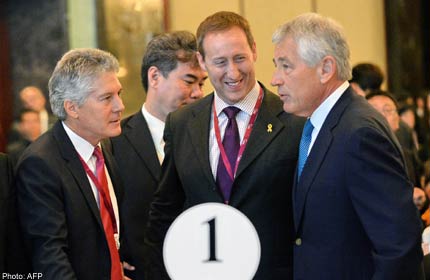
US Defence Secretary Chuck Hagel (R) talks with Australian Minister of Defence Stephen Smith (L) and Canadian Minister for National Defence Peter MacKay (C) at the 12th Asia Security Summit Shangri-La Dialogue 2013 organised by the Institute for Strategic Studies (IISS) in Singapore on May 31, 2013. Hagel arrived in Singapore on May 31 for an Asia-Pacific security conference at which he is expected to press China on cyberattacks and reaffirm Washington's strategic shift to the region.
SINGAPORE - Some might harbour high hopes of a progressive triumph of substance following the style displayed by security chiefs at the recent Shangri-La Dialogue held here.
A robust regional security architecture is the ultimate goal but one should have no illusion about the speed with which it can be built.
Much work and uncertainties lie ahead. Still, laying on the charm while pushing forward beats trading barbs any day.
This was evident in the diplomatic approach of US Defence Secretary Chuck Hagel and in the poise of Chinese delegates on the sidelines of the conference. (Indeed, the growing ease of their officials with the English language, laced with humour at times, did not go unnoticed either at the World Economic Forum at Davos this year.)
But as China's Major-General Yao Yunzhu demonstrated in her grilling of bigwigs, significant policy shifts in Beijing will not come easily. Neither, of course, is the US about to go soft on its "rebalance towards Asia" strategy and its accusations of cyber spying.
Progress, therefore, will depend on measured strides made at Shangri-La, the Asia-Pacific Roundtable, the International Defence Dialogue and similar forums.
These will in turn hinge on the transparency of all players.
Building defence capacity: What is the intention? Japan's plan to boost Asean states' maritime defences: What is the gameplan? Smaller nations will continue to feel edgy about China's might and China will not abandon its suspicions of a containment strategy unless all lay their cards on the table.

Forging agreement on codes of conduct is a constructive way of securing the peace until more durable solutions are achieved.
The "no first use of force" pact, first proposed at the Asean Defence Ministers' Meeting last month and advocated at the Shangri-La Dialogue, is well worthy of support, as Defence Minister Ng Eng Hen underscored.
With so many conflicting claims over parts of the South China Sea, a "deficit of trust", as some refer to it, is building up in the region. As the recent Taiwan-Philippines incident shows, it does not take much for tensions to be escalated.
Similarly, there is merit in working out rules to prevent flare-ups in cyberspace. A code of conduct has a better chance of evolving if there is more sharing of cyber security experience and joint action to tackle cyber threats.
Even as more collaboration is promoted in regional security networks, rising nationalism will lead to belligerent acts played out publicly when incidents arise. None of these should influence the tone and style of the security forums.
A mature and collegial approach that is consistently maintained by participants may well lead to substantive policies of a similar character evolving in the region for the common good.


